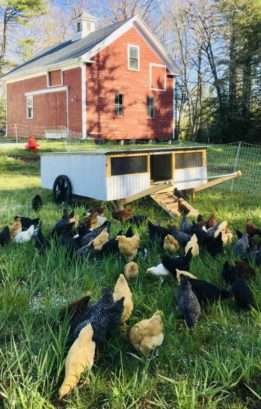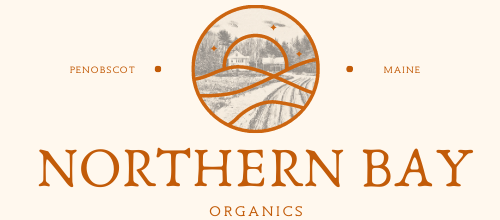How We Farm

Chicken flock on pasture
Our Practices
Building a Framework
Our production practices are based on the creation and maintenance of a biologically-active, fertile soil. Our main goal is to provide the community with access to clean, wholesome food while maintaining a sustainable environment by using regenerative land management techniques.
Although we are not Certified Organic, we do produce everything we grow using organic methods. We do not use any pesticides, sprays, or chemicals on our land. We do not use synthetic fertilizers, and rely primarily on soil health and integrated management practices for the success of our crops.
We believe that limited soil disturbance, focused around no-dig/no-till methods and a sufficient supply of organic matter, is essential for building healthy soil biology and ecology.
We are committed to giving a portion of everything we produce directly back to the community.
We strive to provide the healthiest, most nutrient-dense produce possible – and to deliver that food at peak of freshness.
Our Methods
Putting it into Action
No Till
We use organic compost to build raised beds and employ minimal-soil-disturbance practices in order to foster a biologically-active soil. Healthy, living soil is vital to the ecological processes that support natural, non-chemical food production. The overall goal is not to directly supply nutrients to the plant, but rather to create and maintain a biologically-active, fertile soil in which a healthy soil/plant relationship can exist – supported by mycorrhizal fungi and microbial activity.
Our cultivation processes mimic natural fertility systems by using organic matter to supply nutrients and improve soil tilth, while fungal activity and soil microbes break down nutrients, making them biologically-available to plants.
No Spray
No chemicals. No pesticides. Even though there are many organic approved biopesticides, it does not mean that these compounds are safe – either for human ingestion – or for the surrounding environment. We believe chemical-free food should mean just that – NO CHEMICALS – and that food should be clean and safe to eat right from the plant.
Instead of pest treatment, our focus is on correcting the underlying causes of pest problems by creating optimal soil conditions to strengthen plants biologically, rather than treating the symptoms via the use of pesticides. We also employ the use of beneficial insects and soil-dwelling Nematodes as part of our integrated pest management approach, which means pesticides (even organically-derived products) are not necessary.
Pastured Poultry
We strongly believe livestock are best raised outdoors on grass-based pasture systems to the fullest extent possible. Farm animals are an integral part of a productive, wholistic farm, and allowing them to graze freely provides a number of benefits both to the animals, as well as the soils and surrounding landscape. Grazed pastures can enhance soil fertility and encourage biological diversity.
Grazing livestock benefit the soil; diverse pasture benefits the livestock. Animals are healthier and more active, with access to fresh air, fresh grass, and ample forage. Using a rotational pasture system also serves to break the parasite cycle which means that we do not need to employ the use of antibiotics to keep our animals healthy; And as a bonus, naturally distributes the fertility produced by the animals.
Native Plants & Beneficial Insects
We produce a large a selection of native perennial plants each spring and incorporate native plantings as an integral part of the design and function of a productive agricultural ecosystem. Native plants provide habitat that supports populations of butterflies, bees, birds and all forms of life. They also make our landscapes more adaptable to future environmental stressors due to climate change, temperature swings, drought, flooding and pest outbreaks.
Beneficial insects are employed in tandem with native hedgerows and ‘trap crops’ to control pest populations without the use of any pesticides.
On-site Fertility
We have successfully been able convert what was previously agriculturally-unusable land into highly productive vegetable plots by adding lots of organic compost, seaweed from the nearby coast, and targeted use of cover-cropping.
“Since soil fertility on the organic farm is not powered by fertilizer inputs but, rather, by easily understood soil management techniques, this food production system is accessible at no cost by farmers everywhere and can thus nourish the planet with exceptional food in perpetuity.” – Eliot Coleman
Both seaweed and leaf mulch compost are widely used in our crop production and provide fertility and soil conditioning functions. Seaweeds can provide a natural form of potash (soluble potassium) and also serves as nutrient-rich mulch to overwinter garden beds. Hay is harvested during summer and used as bedding for ducks and geese, which is then composted. Wood chips obtained when clearing the surrounding land or pruning trees are used between garden beds as mulch, which encourages mycorrhizal fungi and further increases organic matter.
Resilient Local Food Networks
We believe the future of a sustainable and resilient food network relies on strengthening our LOCAL food distribution systems. Working together within our community with the goal of improving availability and especially the quality of food improves food security for everyone. Hyper-local food networks enable us to deliver to customers the day of harvest, or very soon after.
Reliance on LOCAL food means:
- Access to the freshest, most nutritious foods available year round
- Supporting the interests of small-scale food producers in your community
- Helping to preserve the sustainable stewardship of our rural landscapes
- Sustaining local jobs and businesses
We engage and work together with local partners such as Healthy Acadia, The Magic Food Bus, The Healthy Island Project, and The Blue Hill Co-op to improve community access to locally-grown products through a restructured and robust local food system.
Organic*
We are NOT currently Certified Organic. We do produce everything we grow using organic methods, and aim to hold ourselves to even higher standards than certification requires. We do not use any pesticides, sprays, or chemicals on our land – not even those allowed under organic standards.
“When we said organic, we meant local. We meant healthful. We meant being true to the ecologies of our regions. We meant mutually respectful growers and eaters. We meant social justice and community.” –Joan Dye Gussow
We are supporters of MOFGA and highly value the high-quality programming and services they provide to the organic farming and gardening community here in Maine. Some of the best farmers we know work on Certified Organic farms, and there are many incentives and reasons some growers may want to choose certification for their farm or business.
For now, choosing to undergo certification would represent a significant cost to us– That’s before we have purchased seeds. Before we account for compost or beneficial insects. Before all other costs related to maintaining a sustainable agricultural system. We would prefer to put the potential cost of certification directly back into the land by implementing real organic management practices, rather than paying into a certification program that favors industrial scale agriculture, over local, organically-grown food from within our own community.
We rely on a relationship of trust between ourselves as growers and our customers as patrons; Please feel free to reach out if you have any questions or thoughts related to our practices, and we happily invite you to visit in person to see for yourself how we grow your food.
